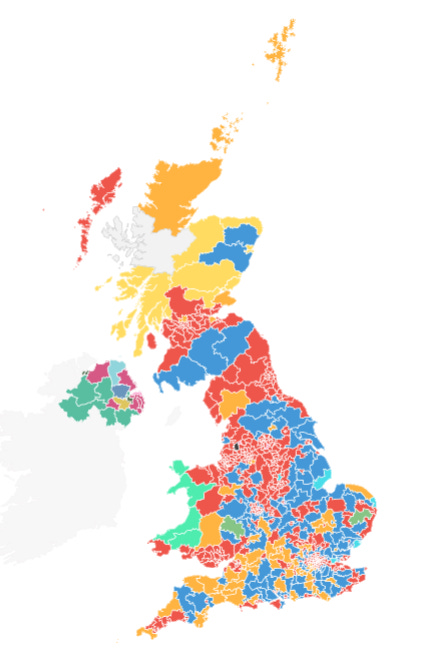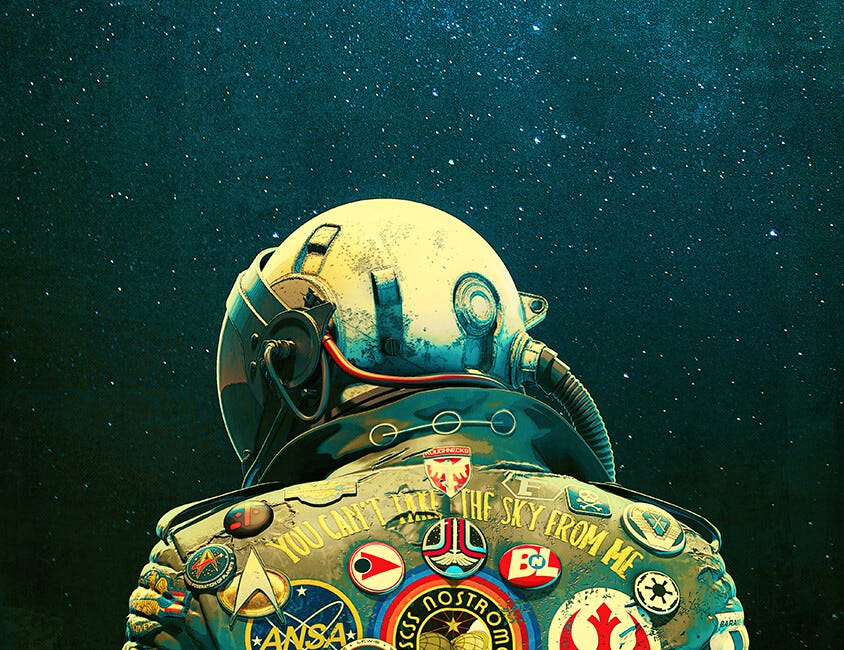It’s late, I’m tired, and somewhat inebriated, but am also going to be preoccupied for the next week or so and want to get this out before I travel, while it’s still fresh and, hopefully, somewhat relevant. Editing will be sloppy in this one, please no bully.
The Conservative wipeout was disappointingly not the annihilation that early polls predicted. The Tories were successful in scaring a critical mass of boomers in a last minute get-out-the-vote effort. At the same time, I suspect that some incidents late in the election that were used to paint Reform as raving Nazis were successful in driving down the Reform vote. One such incident involved a marginal Reform candidate caught on microphone being extraordinarily vulgar, who later turned out to be an actor that specialized in playing precisely the sort of character he was portraying for the media, which is of course all rather suspicious.
As a result, Reform only got 4 seats. This was less than the 13 that were predicted by the BBC based on exit polling, which prediction was revised to the 4 that Reform in fact won partway through counting, as the models’ Bayesian priors were updated accordingly, no doubt. That said, among those 4 seats is Nigel Farage, who is now a sitting member of Parliament.
That Parliament is now, in all likelihood, in the hands of the weakest massive majority government in its history, and if that’s not true (British history in its entirety being rather extensive), certainly close to it.
Keir Starmer’s Labour has 412 seats of Parliament’s total 650, giving it an unassailable majority. This is not because of a sudden surge in their popularity: their share of the popular vote didn’t budge, from around a third of the population. Turnout was moreover unenthusiastic, about 59% of the population I think, which while not as wince-inducing as the nearly 50% participation that the BBC was claiming throughout most of the counting period, is still nothing to write home about. The total number of people who voted for Labour decreased by 600,000. Labour cannot claim any sort of popular mandate, and they know it.
This happened primarily because of the collapse in the popularity of Rishi Sunak’s Conservative Party, who lost 251 seats, and saw their share of the popular vote decline by twenty percent. Voters wanted the Tories to sharply reduce immigration, fix the housing market, and get Brexit done (which they finally got around to doing. Poorly). Instead Sunak told the kids he was going to ban them (and only them) from smoking, because their health you see, and then that he was going to draft them for slaughter in the frozen mud trenches of the Donbass. This pungent combination of frivolity and bloodlust is, it turns out, unpopular. Amazingly, after a catastrophic loss in the only election he’s ever faced, Sunak is not slinking away in disgrace to a run a call centre in Delhi or something similarly appropriate to his talents, but is staying on as party leader.
While still the second-largest party in Parliament with 121 seats, the defeat is the worst in a history that goes back to 1834, when the Conservatives split off the Tories and promptly absorbed them. Before this rebranding, the Tories had been around since 1679. This humiliation hasn’t destroyed them, but the party will never be the same. In all probability its fate is to be carved up and eaten by Reform over the next several years, but we’re clearly a long way from that yet.
The secondary reason for Labour’s good fortune was the simultaneous collapse of the Scottish National Party, who lost 38 seats, reducing them to 9. The SNP were driven into the ground by Humza Yusuf’s spiteful fumbling, but it had been badly piloted for some time. They flubbed the Scottish independence referendum, which was really their entire point as a party, and have been uselessly bothering everyone about transgender this or islamophobic that ever since. The Scots were sending a message to their party
While Labour was the big winner from this wave of unenthusiasm, they were not the only beneficiaries. The big winner in Parliament were the Liberal Democrats, who picked up 63 seats to obtain 71, making them the third-largest party in Parliament.
The Liberal Democrats are not, however, the third most popular party, having achieved only 12% of the popular vote. The third most popular party is actually Reform, who obtained 14% of the popular vote, a remarkable achievement in a party that’s been around for a matter of months. This incredible disconnect between popular mandate and parliamentary voting power is a perverse consequence of Britain’s first past the post system, and is being much remarked on. There will be increased pressure in the future for proportional representation to be introduced in some form.
Reform and the Lib Dems were not the only beneficiaries of the Conservative collapse. This can be seen immediately in the crazy quilt of the electoral map, which despite Labour’s two-thirds majority, is planted with the flags of all sorts of weird political tribes.
My favourite part is Northern Ireland, where Sinn Fein held its 7 seats (making it the fifth-largest party after the SNP), and the rest of it is split up in an impenetrable jumble of splinter parties vaguely associated with different reasons for remaining part of the UK and/or the EU. Wales has been painted bright green by Plaid Cymru1, the Party of Wales, who doubled their presence in parliament to 4. This is the same number of seats as Reform got, despite Plaid Cymru having gotten just under 200,000 votes, as compared to Reform’s 4.1 million, yet another perversity of first-past-the-post.
To everyone’s disappointment, first-past-the-post did not deliver a seat into the hands of the Monster Raving Loony Party, who received only 5,814 votes, a dismal 0.02% of the total 28.4 million votes cast. I do not know what kind of person votes for the Monster Raving Loony Party, but I bet they are absolutely fascinating. They should consider moving to one of Britain’s remote underpopulated islands, the Orkneys perhaps, where they might just be able to take over a seat. Having a strong, concentrated regional presence seems to be the best way to get members into Parliament in a first-past-the-post system, and having a sitting member for the Monster Raving Loonies would be even funnier than having Nigel in there.
First-past-the-post gets a lot of hate, and I’ve been ripping on it here, but it actually seems well-suited to an island which is shared by a bunch of squabbling ancient tribes. While it tends to produce majorities quite easily due to the winner-take-all nature of the contest within each riding, this also allows areas with strong regional identities to assert a disproportionate presence in parliament, despite getting a measly percentage of the vote. Not that that especially matters, given the aforementioned tendency for the system to hand out crushing jackpot majorities to the dominant players, as it has indeed done once again.
With the sole exception of Reform, there has not been any wave of enthusiasm for any of the parties in parliament. Large numbers of voters simply stayed home, whether tuning it all out or punishing their home parties while failing to see anything they wanted to vote for. It is as though the tide has gone out, exposing the sand and rocks of the sea shore. Whether this is a regular tide, which will gently slosh back in again in time, or a tsunami, remains to be seen. Certainly it feels that the water has receded very far indeed, exposing more of the seafloor’s surface than one normally sees. Say, is that Doggerland over there?
Demographics are going to play out relentlessly in the coming years. For Reform, this probably means rapid growth. They are very popular with teenagers. If sixteen-year-olds could vote, they would have gotten a much larger percentage of the popular vote. Meanwhile, the Conservatives are popular primarily with retirees, who being old, are dying. The conflict between the two is generational in many ways. Conservatives want to keep migration high, because muh pensions need cheap labour and expensive real estate, and a draft polls well, because those kids are lazy and need to learn the values of hard work and patriotism that the boomers successfully shirked. From the zoomer pov, the boomers are setting whatever of their future they haven’t already eaten on fire, damning them to stand in the ashes of a generational potlach. In any case, old people are known for dying, meaning that if the Conservatives keep their wagon hitched to the elderly, their wagon will stop moving; Reform’s voters, by contrast, are young and vigorous.
The other big demographic issue is of course migration. Labour owes its still-dominant share of the popular vote almost exclusively to the new British, who thanks to Tony Blair’s assault on Britain’s cultural and genetic integrity now comprise 18% of Britain’s population. Labour has absorbed almost all of this. If we lazily assume that all non-whites vote Labour (which is obviously an exaggeration), this would mean Labour’s organic support amongst the actual British would be something like 16% of the vote. Let that sink in: without immigrants, Labour would be roughly as popular as Reform, and in fact still less popular than the Conservatives.
In practice, this means that Labour is an unstable coalition of completely incompatible groups that hate another, including both the gender-maddened and the warrior-barbers of Allah, presided over uneasily by an elite of neoliberal managerial technocrats, or at least actors who play those on TV, actual technocrats being in general intellectually formidable and highly competent. Whether this coalition can remain stable is a good question. The Muslim position on Palestine is a red line for them the same way Israel is a red line for the uniparty drones LARPing as technocrats, and the Muslims are in any case quite disgusted by all the weird sex rainbow stuff. The faster Labour naturalizes desert people, the faster the desert people will try to take over the party; failing that, they may well fissure off and form their own party, which would basically tear Labour in two and reduce it to the same level as Reform.
Jeremy Corbyn won his seat, by the way, as an Independent, more or less entirely on a Free Palestine ticket.
While the ruling class is babbling on about rainbows and land disputes in the Holy Land or other nonsense like climate change and so on, Britain itself is falling apart from neglect. Its water system – privatized some time ago, because market efficiencies you understand, and leading as everyone expected to the prioritization of rent extraction for shareholder value creation over little things like maintenance – is now falling apart, regularly issuing warnings to avoid drinking tap water because human sewage has gotten mixed with it. This is third world stuff. The whole country is like that now. Trains that break down, arrive late, get cancelled. High streets abandoned by everything but vape shops and Turkish barbers. Nothing works anymore, to the degree that the industrial basis of civilization in Britain is rotting out from underneath it.
People are angry about that, but since they don’t see anyone who can or will do anything meaningful to address any of it, they cease to care. That big emotional wave rolls back, drawing the water back from the shore. The further it retreats, the more forcefully, and destructively, it is liable to return. It would be a very foolish government indeed that, feeling itself secure in its majoritarian footing, decided to walk out some distance on the seafloor, to pick up a shiny rock that caught its fancy. The wave is liable to return without warning.
Posting will probably be light in the next week or two, as I will be travelling and attending to professional matters unrelated to writing which I expect to demand essentially all of my time, which is yet another reason that I wanted to get this piece out to you while I still could. As always, a huge and special thank you to all my supporters, who make my lazy and dissolute lifestyle possible by paying me to ramble and rave at you, a wonder of the modern age so amazing that it still makes me shake my head in amazement and gratitude.
If you’re new here, you can find a selection of some of my better work here, which spans quite a range of topics, much of it having little to do with politics per se.
Aleksandar Svetski’s Bushido of Bitcoin is now available for pre-order. For the past several months I’ve been helping him edit it, and it’s been a fascinating project to assist with. Svetski meditates on the warrior virtues of feudal Japan, medieval Europe, and the Hellenistic age, asking how these can be adapted to the coming diamond age of cyberpunk multipolarity. There’s a Kickstarter, which is very close to its initial goal has passed its initial goal and is now into stretch goal territory. The promo video is amazing, and worth watching for its own sake:
Which is pronounced played coom-ree because Welsh spelling is weird.










I was in England recently. The country is *totally* destroyed, I don't see how it's possible for them to come back from the unlimited African and Muslim immigration they've imported no matter what they do with elections. The country is still pretty white - far whiter than the U.S. - but the African and Muslim immigrants - whose fertility rates are far higher than the natives - are far less able or willing to integrate than the Catholic hispanics that have mostly swarmed America. I also saw Net Zero propaganda everywhere (i.e. starvation propaganda), and the police in the country are there only to harass the natives and prevent a native uprising while the rapefugees continue their lawlessness. Typical anarcho-tyranny.
Then again, England totally deserves to be destroyed for allying with the Rothschilds to ruin Europe. And this unholy alliance occurred long before the World Wars. According to Ernst Junger, the energy that Dostoyevsky picked up on upon his visit to London in 1862 was that the city was “Baal”:
“Dostoeyevsky apparently saw something reassuring in the looser constitution of Paris and something frightening in the order of London. This attests to his penetrating but humane look. He saw Baal enthroned behind the spectacle on the Thames, and it frightened and fascinated him as it had inspired the portrayals of many others before and after him….
The enduring reputation of this God Bel is of a hard and merciless master. The name Babylon, its principal seat, became synonymous with the metropolis as such, especially in its night side. Beyond this, Dostoyevsky also saw something specific: the stamp of puritanism in which enormous deployments of energy were coupled with an unwavering conscience. Hence, it is no coincidence that it was precisely in those puritanical zones that machine technology and its related forms of exploitation brought forth the precedents and model cases for critical reflections on these same phenomena….
In his Paris days, Dostoyevsky was undoubtedly also in Montmartre, but it was not there that Baal appeared to him to reign. He saw an orderly fabric in the Parisian ambience, in London an obscene disorder. We might have suspected the opposite impression, yet it is precisely here that his artistic incorruptibility is demonstrated - the artist whose gaze penetrates through the social veneer, through the varnish on a masterpiece, to its ground.”
Both of my teenage boys would have voted Reform. Their interest in the election and its outcome surprised me and suggests a groundswell of dissatisfaction and awareness among their age group of how our country is being ruined. Labour's reign will be truly dreadful in terms of swamping us with even more Asians and Africans not to mention their ridiculous swallowing of the nation-destroying climate narrative. I live in a fairly rural area of England and their presence (99% males) is becoming increasingly perturbing.